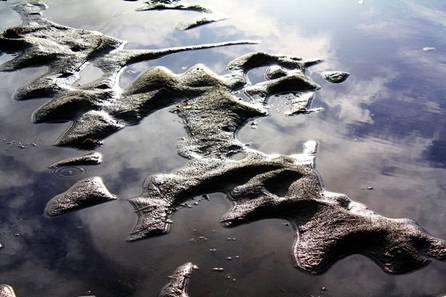Here Comes Socrates
Paul D’Andrea

On the morning after the festival of Heavenly Aphrodite, Pausanias and his friend Cleon were walking near the temple of Dionysus. They were going to meet some friends for breakfast when they saw Socrates coming towards them. Pausanias pulled Cleon into an alley where they couldn't be seen from the street.
Pausanias: (Groans) Oh no, there's Socrates coming towards us!
Cleon: Why are you hiding from him? Have you had a falling out?
Pausanias: (Frowning) I can see that you haven't spent much time with Socrates or you wouldn't ask that.
Cleon: Well, I've heard him speak in public and he seems like an interesting fellow even if he is a bit obscure.
Pausanias: Interesting fellow my foot. Do you know what will happen if he catches up with us?
Cleon: No, tell me.
Pausanias: He'll take hold you with that soldier's grip of his so you can’t get away and then begin his infernal questioning. He'll ask you why do you believe this? What are your reasons for that? How do you know what you think you know? And you’ll feel as though you'd been hoisted up by the ankles and given a good shaking until all your dear little ideas had fallen out of your pockets and broken to pieces on the pavement.
Cleon: (Looking skeptical) He can do all that just by asking a few questions?
Pausanias: Yes, and that's not all. In his determined way, Socrates will prove that all the thoughts you've gathered in your lifetime about everything under the sun are all wrong and that you don't really know anything about the things you thought that you thoroughly understood.
Cleon: I can see how that would upset you.
Pausanias: That's not the worst part. When he’s finished questioning you he'll commence to speak at length (when have you ever heard him speak briefly?) about his favorite notions - love, the gods, kings and philosophers, and finally something he claims is more real than anything else even that stone lying there on the ground.
Cleon: (Nudges the stone with his foot.) What could be more real than that?
Pausanias: During the time he had me in thrall he argued that there exists somewhere in creation a collection of perfect models of every kind of thing in the world, for example, a horse or a wine cup. These things burn brightly like torches in a dark hall. He called them “Forms”, and said that they cast long and distorted shadows on the walls of our existence. The shadows they cast are all the things we think we know about in this world of ours, that which make us comfortable with our existence. These things he says are nothing more than inferior copies of his bright forms.
Cleon: (Smiling) Does he keep his precious forms in Glaucon's warehouse near the harbor, or do the Gods store them high up on Mt. Olympus and set the Hydra or the Gorgon to watch over them?
Pausanias: I don't know about that, but I do know that after listening to Socrates for the first time, I wasn't able to sleep that night even after drinking the evening away with Lysartis, and you know what a dear funny man he is.
Cleon: Lysartis is an amusing fellow. Yesterday we went together to see Sophocles plays The Clouds in which he pokes fun at Socrates. We enjoyed ourselves immensely. Socrates was there and I heard him chuckle so I know he wasn’t offended.
Pausanias: Yes but listen. Socrates' gruff voice followed me wherever I went, chattering away about all the things we’d talked about that day. And the more I listened the more melodious his voice became until I was thoroughly smitten with the man. I couldn't stay away from him. Now this nightmare continued until eventually I become the laughing stock of all our friends and acquaintances. They would greet me in the street by saying. “Hello there Socrates' little goat, where is your horny father today.” And they’d laugh like they'd said something witty. All that came to an end one afternoon when Socrates overheard them and corrected their importunities with his cudgel. After that they let me alone.
Cleon: Poor fellow, I can see that you've had a hard time with your Socrates.
Pausanias: Well, never mind, that's all over with now. I've escaped from Socrates' enchantment and changed back into my own shape like Odysseus' crew did on Circe's island. And if I ever find myself falling under his spell again, I'll go to my house in Ephesus and after a good rest come back to Athens as fat as a pig.
Then the Gods ordained that a familiar figure that resembled Silenus should appear at the head of the alley. It bellowed at them in a great voice like Zeus the thunder wielder until the very walls shook.
Socrates: Halt Pausanias! Are you trying to escape me? You can't you know, so come over here and face the music.
Pausanias shrieked and ran away up the street like Hector trying to escape the wrath of Achilles. Socrates laughed. Then he walked over and seized Cleon.
Socrates: Well I've lost Pausanias, but at least I have you as my prisoner you pretty man so let's march over to Agathon's house where we'll dine well at his expense.
Cleon (Smiling): All right Socrates, I submit to being your prisoner for today, and I'll go along with you quietly.